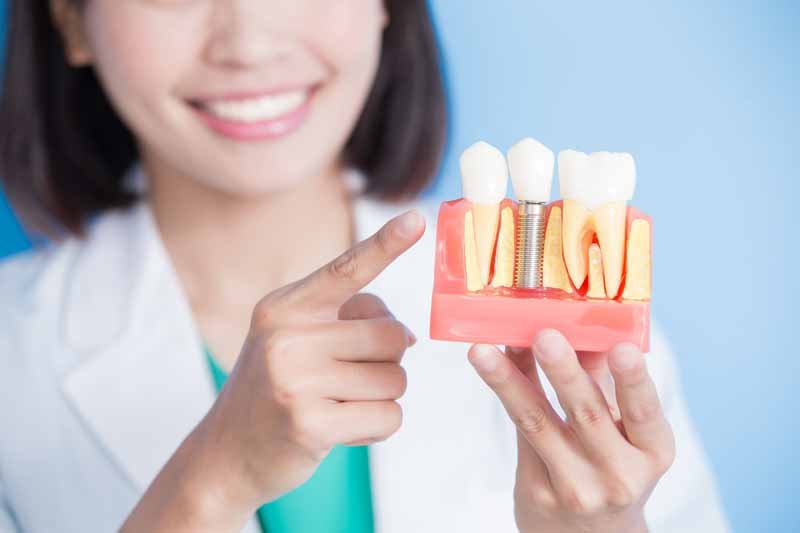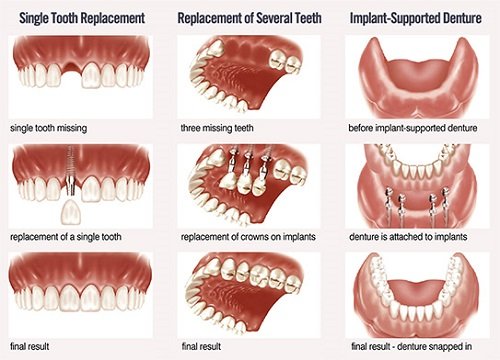What Are Dental Implants in kuwait ?
Dental implants in kuwait which have been successfully used for over decades, offer a reliable solution for replacing missing teeth with artificial tooth include titanium or ceramic are surgically implanted into the jawbone to serve as artificial tooth roots and function as natural tooth roots, dental implants provide a stable foundation for fixed or removable replacement teeth.

With over 10% population are undergoing dental implants placed annually in the Kuwait alone, this tooth replacement option is widely recognized for its effectiveness in restoring dental function and aesthetics and offer a long-lasting solution.
Who Needs Dental Implants?
Dental implants are suitable for those who have experienced tooth loss or are facing tooth extraction problems due to decay, trauma, or gum disease.

Those who may benefit from dental implants include:
Missing Teeth: Dental implants offer a permanent solution for replacing missing teeth; maybe it’s a single tooth, multiple teeth, or entire arch.
Denture Problems: individuals experiencing discomfort or difficulty with removable dentures can have better and secure alternative by anchoring the dentures to the jawbone.
Jawbone Loss: it can help prevent further deterioration of the jawbone by stimulating bone growth and maintaining facial structure.
Seeking Long-Term Solutions: Unlike traditional bridges or dentures, dental implants offer a durable and long-lasting solution that can withstand normal chewing and speaking functions without the need for frequent adjustments or replacements.
Types of Dental Implants
There are several types of dental implants available, Some common types of dental implants include:

Endosteal Implants: Endosteal implants are common type of dental implant and typically made of titanium. These implants are surgically placed directly into the jawbone and provide a sturdy foundation for artificial teeth suitable for individuals with good jawbone density and volume.
Subperiosteal Implants: Subperiosteal implants are placed on top of the jawbone but beneath the gum tissue. These implants are used when the jawbone is not strong enough to support traditional endosteal implants or when bone augmentation procedures are not feasible.
All-on-4 Implants: implant-supported denture designed to replace an entire arch of teeth.four implants are strategically placed in the jawbone to support a full set of fixed artificial teeth. All-on-4 implants offer a cost-effective and efficient solution for individuals with significant tooth loss or those seeking a more stable alternative to traditional dentures.
Mini Implants: smaller in diameter than traditional implants and are often used in situations where there is insufficient bone density or space for larger implants. These implants can be placed with less invasive surgical techniques and are suitable for stabilizing removable dentures or supporting individual crowns.
Zygomatic Implants: longer implants that are anchored in the zygomatic bone (cheekbone) rather than the maxillary (upper jaw) or mandibular (lower jaw) bone. These implants are used in cases where there is severe bone loss in the upper jaw, allowing for the placement of implants without the need for bone grafting procedures.
Dental Implant Procedure:
Initial Consultation
Treatment Planning
Dental Implant Placement
Osseointegration
Abutment Placement
Restoration
Follow-Up Care
Conditions to follow after dental implant
Do not spit Directly. Use a tissue to wipe mouth
Best Choose To swallow your saliva For A day.
Drink straight from the cup, no need straw or other items.
Stop smoking for few days.
Try to Keep fingers and tongue away , Avoid Touching surgical area.

